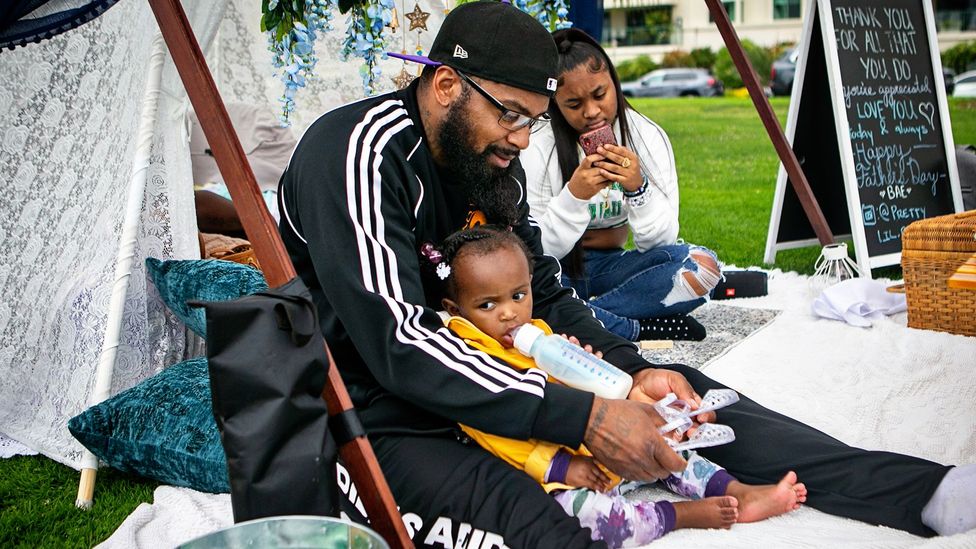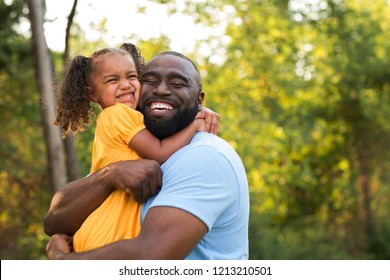The riddle of how humans evolved to have fathers

Lee Gettler is hard to get on the phone, for the very ordinary reason that he's busy caring for his two young children. Among mammals, though, that makes him extraordinary.
"Human fathers engage in really costly forms of care," says Gettler, an anthropologist at the University of Notre Dame. In that way, humans stand out from almost all other mammals. Fathers, and parents in general, are Gettler's field of study. He and others have found that the role of dads varies widely between cultures — and that some other animal dads may give helpful glimpses of our evolutionary past.
Many mysteries remain, though, about how human fathers evolved their peculiar, highly invested role, including the hormonal changes that accompany fatherhood. A deeper understanding of where dads came from, and why fatherhood matters for both fathers and children, could benefit families of all kinds.
"If you look at other mammalian species, fathers tend to do nothing but provide sperm," says Rebecca Sear, an evolutionary demographer and anthropologist at the London School of Hygiene and Tropical Medicine. Mothers carry the burden in most other animals that care for their children, too. (Fish are an exception – most don't tend their young at all, but the caring parents are usually dads. And bird couples are famous for co-parenting.)
Even among the other apes, our closest relatives, most dads don't do much. That means mums are stuck with all the work and need to space out their babies to make sure they can care for them. Wild chimps, for example, give birth every four to six years. Orangutans wait as long as six to eight years between young.
Anthropologists used to assume that fatherly behaviour could evolve only in monogamous animals, Rosenbaum says. Species like the mountain gorillas undermine that assumption. They also show that, despite what scientists have long thought, male animals don't have to choose between spending their energy on mating or parenting. It seems taking care of kids can be a way of getting mates.

Studies of human dads and stepdads have hinted at the same idea. "A lot of guys will willingly enter into relationships with kids they know aren't theirs," says Kermyt Anderson, a biological anthropologist at the University of Oklahoma. That investment might seem paradoxical from an evolutionary perspective. But Anderson's research suggests that men invest in stepchildren and even their own biological children partly as an investment in their relationship with the mother. When that relationship ends, fathers tend to become less involved.
A human dad who cares for his children or stepchildren is different, of course, from an ape or monkey who just lets youngsters hang around. But Gettler and Rosenbaum wonder whether our own ancestors had similar habits to mountain gorillas or macaques. Under the evolutionary pressures they faced, these friendly tendencies toward children could have ratcheted up into devoted fatherhood.

Although humans fathers are unusual among animals, fatherhood can also vary greatly among humans too (Credit: Jason Armond/LA Times/Getty Images)
Some clues to the evolutionary history of fatherhood are also written in the molecules of men's bodies.
Gettler worked on a long-term study of men in the Philippines, gathering biological data from them in their early 20s and following up five years later. He and his colleagues found that men with higher testosterone in their early 20s were more likely to have partners and children later on, when researchers followed up. But those new dads no longer had high testosterone — it had dropped dramatically, especially if they had a newborn at home. Once a man's youngest child was a toddler, his testosterone began to creep back upward.
Testosterone is linked to mating and competitive behaviour in male animals. Suppressing it might be nature's way of preparing fathers to cooperate with their partners and care for children, the researchers say. Although caring fathers are rare among mammals and most other animals, many can be found among birds — and those bird fathers also experience testosterone dips.
Prolactin is another hormone linked to paternal behaviour in birds — this time, doting bird dads have more of it — and some studies have hinted at a similar effect in humans. Although we're only distantly related to birds, evolution may have used the same mechanisms to encourage fatherly behaviour in both animals. Understanding those mechanisms better might help us learn how fatherhood evolved.
"If we understand the physiological pathways that underpin care in those other species, we can look to see if the same signatures occur in human fathers," says Gettler.
It's clear human fathers are unusual in their attention to their children. "However, it's also clear that fatherhood in humans is quite variable," Sear says. Not all dads are doting, or even present.
Research has shown that fathers can have important roles in directly caring for their children, for example, and teaching children language and social skills
But that doesn't necessarily affect basic survival. In a 2008 paper, Sear and co-author Ruth Mace asked whether children with absent fathers are likelier to die. They reviewed data on child survival from 43 studies of populations around the world, mostly those without access to modern medical care. They found that in a third of the studies looking at fathers, children were more likely to survive childhood when their dad was around. But in the other two-thirds, fatherless kids did just as well. (By contrast, every study of children without mothers found they were less likely to survive.)

"That is not what you would expect to see if fathers are really vital for children to thrive," Sear says. Rather, she suspects that what's vital are the jobs fathers perform. When a father is missing, others in the family or community can fill in. "It may be that the fathering role is important, but it's substitutable by other social group members," she says.
What is that role? Historically, Gettler says, anthropologists have viewed fatherhood as all about "provisioning" — bringing home the bacon, literally. In some foraging communities, more successful hunters also father more kids. But Gettler hopes to help expand the definition of a father. Research has shown that fathers can have important roles in directly caring for their children, for example, and teaching children language and social skills.
Fathers may also help their children by cultivating relationships in their communities, Gettler says. When it comes to survival, "Networking can be everything."
The ancestors of humans, though, committed to a different strategy. Mothers got help from their community and their kin, including fathers. This freed them up enough to have more babies, closer together – about every three years, on average, in today's nonindustrial societies. That strategy "is part of the evolutionary success story of humans", Gettler says.
Some clues about the origin of doting fatherhood come from our close primate relatives.
* This article originally appeared in Knowable Magazine, and is republished under a Creative Commons licence.
--
Join one million Future fans by liking us on Facebook, or follow us on Twitter or Instagram.
If you liked this story, sign up for the weekly bbc.com features newsletter, called "The Essential List". A handpicked selection of stories from BBC Future, Culture, Worklife, and Travel, delivered to your inbox every Friday.


Comments
Post a Comment